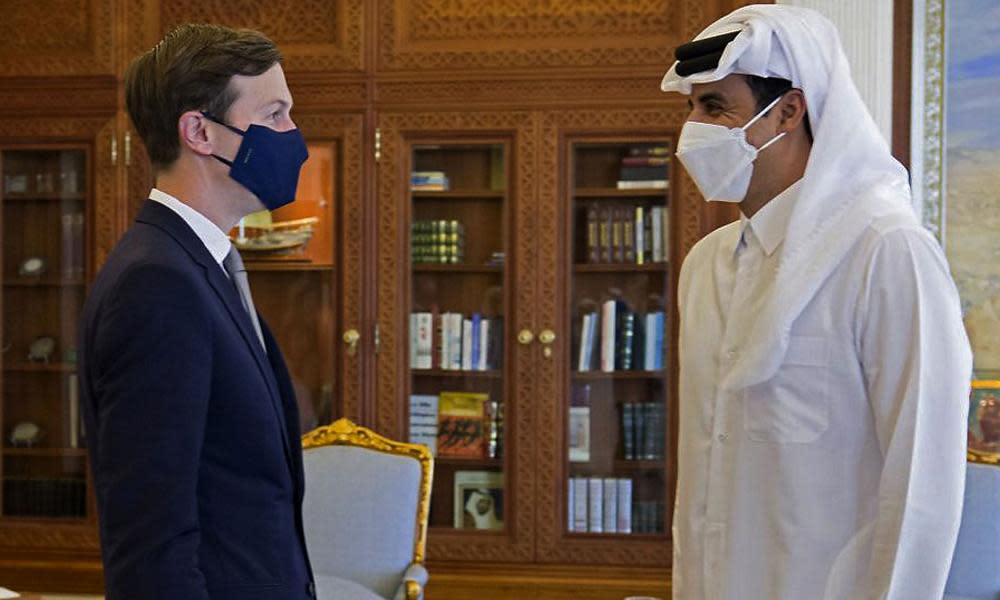Breakthrough in Qatar dispute after 'fruitful' talks to end conflict

A breakthrough in the three-and-a-half-year dispute between Qatar and its neighbouring Gulf states appears to have been achieved following what were described as “fruitful” talks to resolve the conflict.
The Saudi foreign minister, Prince Faisal bin Farhan Al Saud, said “significant progress” had been reached in the last few days and he was optimistic all countries were close to finalising a resolution.
In talks brokered jointly by Kuwait and Donald Trump’s son-in-law Jared Kushner, Saudi Arabia appears to have agreed to open its land and air border with Qatar as a confidence-building measure.
Qatar has been subject to a political and economic blockade by Bahrain, Egypt, Saudi Arabia and the United Arab Emirates, known as the quartet, in a complex dispute turning partly on personal rivalry, and Saudi anger at Qatar’s independent-minded foreign policy.
The Trump administration had tried to broker a deal before, aware that energy-rich Qatar had shown itself capable of surviving the blockade, and was increasingly being drawn into an orbit closer to Turkey and Iran, something the president’s team dreaded. Qatar is the site of the US’s largest military base in the Gulf.
If the air blockade were lifted, Iran would be a loser since it has received nearly $100m from Qatar Airways in overflight fees, but Qatar’s ministers stressed they were not willing to abandon Iran.
The principle of an agreement will either be seen as a welcoming gift to Joe Biden by a Saudi royal family nervous of Biden’s intentions to the kingdom, or else a final success by Kushner in re-establishing a powerful anti-Iranian alliance across the Gulf.
Speaking earlier at the Roma Med 2020 conference, Qatar’s foreign minister, Sheikh Mohammed bin Abdulrahman al-Thani, said there had been progress, but stressed any deal could not be a bilateral agreement between Qatar and Saudi Arabia. He said it had to involve all the parties to the dispute, including the UAE. There have been reports the UAE is holding out against a deal.
Al-Thani also stressed that any solution must not curtail the sovereignty of Qatar’s foreign policy. “No country is in a position to impose any demands on another country, whether from Qatar or from the quartet … Each country should decide its foreign policy,” he added. “We believe that Gulf unity is very important for the security of the region. This needless crisis needs to end based on mutual respect.”
Constantly referring to the mediation role of Kuwait, and not Kushner, he also defended the financial support between Qatar and Turkey. He also stressed Qatar had no interest in normalising relations with Israel, a step taken by Bahrain and UAE.
The Saudi foreign minister said the normalisation steps were welcome, but only so long as they helped deliver a workable Palestinian state on the basis of the 2002 Arab peace plan.
The remarks suggest Qatar feels it has not ceded much ground to Saudi Arabia to secure the deal, and certainly has not succumbed to the 13 demands originally tabled by the quartet as the price of an agreement.
The 13 demands would have amounted to surrender by Doha since they included closing Al Jazeera television, closing a Turkish base, cutting links to the Muslim Brotherhood and downgrading ties with Iran, which shares a huge gas field with Qatar. The dispute has brought the Gulf Cooperation Council to an effective standstill.
News of a breakthrough came when Kuwait’s foreign minister, Sheikh Ahmed Nasser Al-Sabah, said on Friday “fruitful” discussions had taken place to resolve the Gulf crisis, which has continued since 2017 between Qatar on the one hand and Saudi Arabia, the Emirates, Bahrain and Egypt on the other.
He explained through a speech broadcast by Kuwait TV that in the talks “all parties affirmed their keenness on Gulf and Arab solidarity and stability and to reach a final agreement that would achieve what they aspire to in terms of lasting solidarity between their countries and the good of their people”.
The Kuwaiti minister thanked Kushner, adviser to the US president, for “the fruitful results that have been achieved in the way of resolving the dispute”.
For his part, the Qatari deputy prime minister and foreign minister said in a tweet to him on Twitter that “the statement of the state of Kuwait is an important step towards solving the Gulf crisis”.


